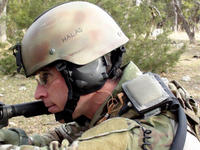-
Engineering competition features Blue Tooth-capable trebuchet
During the first Storm the Citadel Trebuchet Competition in Charleston over the weekend, Google employees combined Android cell phones, a computer the size of a credit card, and a Blue Tooth receiver to trigger a medieval weapon used in the twelfth century to destroy enemy fortifications
-
-
New association for maritime security industry formed
Maritime security consultant Peter Cook recently announced the formation of the Security Association for the Maritime Industry (SAMI); SAMI will help establish rules and regulations in the fledgling maritime security industry; the maritime security industry has grown rapidly in recent years, but has suffered from lack of regulation and rapid expansion; the industry’s reputation has been tarnished with incidents of hired security firms abandoning ships when pirates attack leading to long periods of captivity for the ship’s crew; to prevent these incidents from occurring and to uphold the reputation of the industry, SAMI will vet maritime security companies, establish standards, and ensure that its members comply with established standards
-
-
Tainted apps make their way into official Android store
More than fifty applications have been found to be infected with a new type of Android malware called DroidDream, an information stealer; fraudsters repackaged legitimate apps (mostly games) so that they included malicious code before uploading them to the marketplace; the tactic has been seen in mobile marketplaces in China and elsewhere but this is the first time the approach has been successfully applied in the United States
-
-
ASIS and (ISC)2 join forces for annual security conference and more
(ISC)2 will hold its first annual Security Congress in conjunction with ASIS International’s 57th annual Seminar and Exhibits conference in Orlando, Florida; the combined events are expected to attract more than 20,000 security professionals from around the world; during the conference the two organizations will jointly offer certification seminars for various security and technology-related credentials; (ISC)2 and ASIS signed a deal to work together and leverage their mutual strengths and membership bases; beyond the conference, the two organizations will work together on developing educational programming, research, and legislative issues; the ASIS International conference will be held from 19 September 2011 to 22 September 2011
-
-
Kenya orders 100,000 more biometric ID cards from OTI
On Track Innovations Ltd. (OTI) recently received an additional order for 100,000 of its MediSmart healthcare biometric ID cards; the cards were purchased by Kenya’s Smart Applications International Ltd. (SMART) for use in medical facilities across Kenya; the card contains a microchip that stores a patient’s name, picture, signature, and medical treatment records; SMART has already issued an estimated 200,000 MediSmart cards to combat fraud
-
-
Acoustic gunfire detection devices heading to the field

Technological developments may one day create artificial soldiers, but until they come along, the United States and other countries will continue to rely on human soldiers; the militaries thus want to preserve as many of their soldier’s lives as possible; to that end, Shoulder-Worn Acoustic Targeting System (SWATS), which helps Marines zero in on enemy sniper fire, is a godsend to the United States; asymmetric warfare favors the forces that can strike and runaway unharmed, but with plentiful acoustic sensors in the field it will be that much harder for snipers to ambush U.S. soldiers and live to escape
-
-
Law enforcement, and domain name registrars discuss ways to tackle net crooks
Police and other law enforcement agencies in the United States and the United Kingdom are increasingly turning their attention to domain names as an Internet choke-point that can be used to shut down Web sites selling counterfeit goods and enabling the trading of pirated movies and child pornography
-
-
Are your phones really secure?
Breakthroughs in technology have enabled malicious actors to listen in on any conversation using your phone even when not in use; eavesdroppers have circumvented encrypted audio channels by relying on a relatively simple principle in physics — resonance; by tapping into an object’s natural resonance, spies have turned phones and phone cables into listening devices even when they are not in use; researchers at Teo, a manufacturer of secure telecommunications equipment, were able to capture human voices using standard phones, unplugged Ethernet cables, or even a rock; to address this security gap, Teo has designed its IP TSG-6 phones with special vibration dampening circuitry and materials that render them impervious to these types of listening devices
-
-
Android apps send private data in the clear

Cell phones running the Android operating system fail to encrypt data sent to and from Facebook and Google Calendar, shortcomings that could jeopardize hundreds of millions of users’ privacy; Facebook’s recently unveiled always-on SSL encryption setting to prevent snooping over insecure networks — but the encryption is no good, meaning that all private messages, photo uploads, and other transactions are visible to eavesdroppers
-
-
Harris Corp. awarded $9 million Army contract to boost biodefense
The U.S. Army recently signed a $9 million deal with Harris Corp. to bolster the army’s biological defense capabilities; Harris will provide the Army’s Joint Biological Point Detection System (JBPDS) with its advanced Falcon II AN/PRC-150 high-frequency radio system; the radio system is capable of detecting and identifying biological warfare agents and will automatically send alerts to headquarters when it senses the presence of these agents; JBPDS is a portable self-contained unit designed to automatically detect and identify airborne biological agents
-
-
Border bottlenecks hamper trade
Last year, U.S. exports to Mexico totaled $163 billion, and imports from Mexico totaled $229.6 billion; nearly 80 percent of that trade crosses through land border ports on trucks and railcars; the 1.8-million strong Border Trade Alliance says bottlenecks at border crossings hamper this trade and make it more costly to grow it; the Alliance urges Congress and the Obama administration to invest in border ports of entry, including hiring more staff; Obama’s proposed 2011 budget includes only 300 new Customs and Border Protection officers, while Republicans propose shrinking the Border Patrol by 870 agents
-
-
New SPEXER security radar offers new capabilities in threat detection
Cassidian, the renamed defense and security division of EADS, is showing its new security radar; the company says that SPEXER 2000 is the first security radar using the newest radar technology of Active Electronically Scanning Array (AESA); by electronic guidance of the radar beam, this technology enables the sensor to fulfill several tasks at the same time while increasing the detection capability substantially; therefore, one SPEXER 2000 can replace two or more conventional radars
-
-
Jeb Bush and former Mexican president to headline ASIS 2011

Former governor of Florida Jeb Bush and former president of Mexico Vicente Fox have both agreed to speak at this year’s upcoming ASIS International annual conference in Orlando, Florida; the two former elected officials will be the event’s keynote speakers along with Burt Rutan, the designer of SpaceShipOne, the first privately built manned spacecraft to reach space; last year roughly 22,000 professionals from more than ninety countries attended; this year’s conference is scheduled to take place from 19 September to 22 September 2011; it was estimated that 21 percent of buyers attending last year’s conference were planning on procuring at least $5 million worth of security products and services for the year
-
-
Oil giants struggle to find more oil
Last week Exxon Mobil Corp’s annual financial report showed that the world’s largest oil company was struggling to find more oil; the report revealed that Exxon had only replaced 95 percent of the oil that it pumped out of the ground over the last decade; Exxon now holds more natural gas reserves than oil for future production; the company has replaced its natural gas reserves at higher rates than oil; in recent years large western oil companies have found that most of the accessible oil fields have been tapped, while new regions have been difficult to access both technically and politically; in 2010 Chevron announced that it had only replaced one barrel for every four it produced and Royal Dutch Shell PLC recently announced that next year it will produce more gas than oil for the first time in its company’s 104-year history
-
-
Hummingbird-sized UAV developed

A bird-sized unmanned aerial vehicle that flaps wings for propulsion and hovering has been developed by the U.S. company AeroVironment; The aircraft has a wingspan of 6.5 inches and has a total flying weight of two-thirds of an ounce, which is less than the weight of a common AA battery
-
- All
- Regional
- Water
- Biometrics
- Borders/Immig
- Business
- Cybersecurity
- Detection
- Disasters
- Government
- Infrastructure
- International
- Public health
- Public Safety
- Communication interoperabillity
- Emergency services
- Emergency medical services
- Fire
- First response
- IEDs
- Law Enforcement
- Law Enforcement Technology
- Military technology
- Nonlethal weapons
- Nuclear weapons
- Personal protection equipment
- Police
- Notification /alert systems
- Situational awareness
- Weapons systems
- Sci-Tech
- Sector Reports
- Surveillance
- Transportation
Advertising & Marketing: advertise@newswirepubs.com
Editorial: editor@newswirepubs.com
General: info@newswirepubs.com
2010-2011 © News Wire Publications, LLC News Wire Publications, LLC
220 Old Country Road | Suite 200 | Mineola | New York | 11501
Permissions and Policies
Editorial: editor@newswirepubs.com
General: info@newswirepubs.com
2010-2011 © News Wire Publications, LLC News Wire Publications, LLC
220 Old Country Road | Suite 200 | Mineola | New York | 11501
Permissions and Policies
